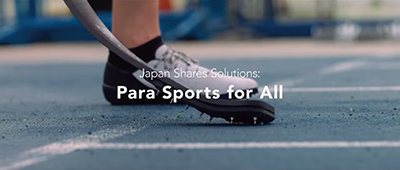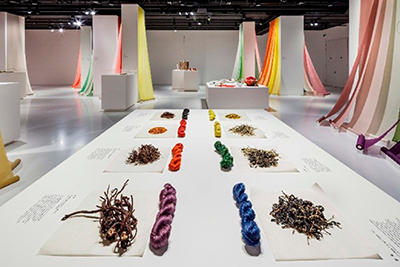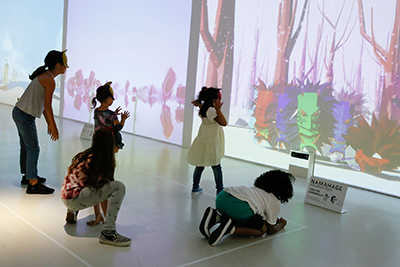Diplomatic Bluebook 2020
Chapter 3
Japan's Foreign Policy to Promote National and Global Interests
Section 4 Efforts to Promote Understanding and Trust in Japan
1 Strategic Communications
(1) Initiatives in Strategic Communications
The Ministry of Foreign Affairs (MOFA) is implementing strategic communications based on the three-pillar approach of (1) making further efforts to disseminate Japan's policies and initiatives, including the accurate image of Japan, (2) sharing Japan's rich and varied attractiveness, and (3) expanding the circle of people with a great affinity toward or knowledge of Japan, while enhancing the capabilities of its overseas missions, which are on the frontlines of public diplomacy. Regarding pillar (1), MOFA focuses mainly on promoting public understanding of Japan's contributions to peace, stability, and prosperity in the international community, and the maintenance and strengthening of the international order based on the rule of law, as well as on enhancing public awareness of issues concerning the recognition of history and the maintenance of territorial integrity. Specifically, MOFA is actively communicating Japan's position and viewpoints through opportunities such as daily press conferences, interviews, contributions of articles, and speeches at official visits to foreign countries and international conferences by the Prime Minister, the Foreign Minister, and other government officials. Japan's diplomatic missions overseas are also actively communicating to the Governments of assigned countries, their citizens, and the media on Japan's position and viewpoints on a range of subjects including the recognition of history and the maintenance of territorial integrity. When foreign media outlets publish reports that include factual errors, MOFA promptly sends rebuttal pieces or provides explanations under the name of ambassadors, consuls-general, or the Press Secretary of the ministry to ensure that media reports are made based on objective facts. In addition, MOFA actively communicates with the public via social media and websites, while creating publicity materials such as videos on Japan's foreign policy and utilizing them in a variety of forms. Furthermore, in order to make Japan's basic position and viewpoints on policy issues understood, it is also important to enhance coordination with experts and think tanks. From this perspective, MOFA invites influential experts and media personnel to Japan from abroad, and provides them with opportunities to exchange views with various people including Japanese government officials, as well as to visit various places around Japan for study tours and to conduct interviews. MOFA dispatches Japanese experts abroad, while extending its support for Japan-related seminars conducted by overseas research institutions.
 “Japan Shares Solutions: Para Sports for All” promotional video on Japanese policy
“Japan Shares Solutions: Para Sports for All” promotional video on Japanese policy (published beginning July 19, 2019 on the Ministry of Foreign Affairs' YouTube channel and broadcast by CNN)
In 2019, in the face of disturbances in the rules-based, free, and open international order and the increasing unpredictability and uncertainty in the international community, Japan has taken opportunities, such as hosting the G20 for the first time and holding the Seventh Tokyo International Conference on African Development (TICAD7), to actively share its efforts in demonstrating its leadership under the principle of international cooperation and contributing to the peace, stability, and prosperity of the international community.
By taking advantage of various opportunities and utilizing various tools, Japan is also engaged in efforts to strategically communicate information about matters on the recognition of history, including the issue of the so-called “comfort women” and various issues on Japan's territorial integrity. In addition, for baseless criticism of the Rising Sun Flag, the Government of Japan is providing accurate information about the flag in a variety of forms, including making multi-language explanatory materials available on MOFA's website, to gain understanding from the international community.1
Concerning pillar (2), “sharing Japan's rich and varied attractiveness,” a variety of efforts involving public relations and cultural projects are being made mainly through diplomatic missions to promote understanding and support for Japan, thereby promoting inbound tourism, an area of concerted national effort. Diplomatic missions around the world have conducted cultural projects (see 2(1)), while the Japan Foundation (JF) has taken initiatives such as the “WA Project” (see 2(2)) and “Japan 2019 (see 2(2)),” as well as the 13th Japan International MANGA Award. Japan has also actively communicated the attractiveness of all areas of Japan, including regions that have been affected by disasters, in various forms including social media.
Concerning pillar (3), “expanding the circle of people with a great affinity toward or knowledge of Japan,” MOFA has been making various efforts to promote people-to-people and intellectual exchanges, and Japanese language education. The efforts include youth exchange programs with Asia, North America, Europe, Latin America and the Caribbean under Japan's Friendship Ties Programs, holding the U.S.-Japan Conference on Cultural and Educational Interchange (CULCON, see 2(4)), and providing support for Japanese studies at universities and research institutions in major countries around the world. To ensure the success of the Olympic and Paralympic Games Tokyo 2020 (the TOKYO 2020 Games), the “Sport for Tomorrow (SFT)” program has been launched to contribute to the international community through sports. Moreover, Japan has worked on initiatives in cooperation with people in the country and abroad to preserve tangible and intangible cultural heritage throughout the world and to promote the inscription of Japan's cultural heritage on the World Heritage List and the Representative List of the Intangible Cultural Heritage of Humanity.
MOFA will continue to effectively utilize a budget for strategic communications while making strategic and effective use of initiatives in accordance with the above-mentioned three pillars, in order to enhance Japan's communication and contribute to the realization of its foreign policy and national interests, through opportunities such as the TOKYO 2020 Games.
- 1 Explanatory materials concerning the Rising Sun Flag are available on the website of the Ministry of Foreign Affairs here: https://www.mofa.go.jp/files/000481576.pdf

(2) JAPAN HOUSE
MOFA has established JAPAN HOUSE overseas communication hubs in three cities, namely São Paulo (Brazil), Los Angeles (U.S.), and London (UK). The purpose is to attract a wide range of people, including those who were not necessarily interested in Japan previously, and to enlarge the base of the people who are interested and well-versed in Japan by communicating Japan's rich and varied attractiveness and policies and initiatives.
JAPAN HOUSE promotes effective communication by (1) communicating through “All-Japan” efforts by the central and local governments, private sectors and other actors, (2) promoting outreach that reflects the needs of local communities, and (3) providing a “one-stop-service” where various information related to Japan can be obtained from one location.
Some of the JAPAN HOUSE exhibitions are chosen based on public proposals in Japan. The proposals selected by specialists are exhibited in all three hubs as touring exhibitions. This format aims to encourage participation by a wide range of groups and individuals while communicating the very best of Japan. MOFA works to provide high-quality exhibitions by leveraging the know-how of experts in those cities and in Japan.
JAPAN HOUSE São Paulo, which opened in 2017, conducts exhibitions themed on Japan's various charms, including architecture, technology, food, fashion, and art. At the “JAPAN 47 ARTISANS” exhibition held from April to July, 2019, aspects of Japanese tradition and history were introduced through pieces made by artists from Japan's 47 prefectures and a series of seminars, which were organized in cooperation with local associations of Japan's prefectures. The exhibition attracted a large amount of public attention. Forums were also held on a variety of topics such as Japan's foreign policy, Japan-Brazil relations, economic cooperation, science and technology, and soccer exchanges. JAPAN HOUSE São Paulo has had a total of 2 million visitors as of February 2020, and it has become one of the city's major cultural facilities.
JAPAN HOUSE London, which opened in 2018, holds a wide spectrum of exhibitions ranging from those themed on traditional Japanese natural dyeing techniques to video installations that use state-of-the-art technologies. From April to May 2019, the facility held the “Living Colours: Kasane – the Language of Japanese Colour Combinations” exhibition, which explored Japan's beautiful traditional colors. August to October saw an exhibition of the works of Mr. Anno Mitsumasa, an artist from Shimane Prefecture. This event, which focused on the life of the artist as well as his works, successfully expressed the Showa era through a variety of means that included installations and workshops. The “WOW: City Lights and Woodland Shade” video installation, exhibited from November 2019 to March 2020, gained considerable public attention by selling traditional toys made in the Tohoku region, which were related to the content of the exhibition. The facility also held a number of forums and seminars on such topics as international relations, earthquake disaster reconstruction, Japan-UK investment promotion, and science and technology.
 “Living Colours: Kasane – the Language of Japanese Colour Combinations” exhibition at JAPAN HOUSE London
“Living Colours: Kasane – the Language of Japanese Colour Combinations” exhibition at JAPAN HOUSE London (London, UK; Photo: JAPAN HOUSE London)
JAPAN HOUSE Los Angeles, which fully opened in 2018, conducts a variety of events such as exhibitions themed on architecture and manga, interactive programs on Japanese food, seminars and forums, and film screenings. From July to September, the venue held an exhibition of interactive media projection installation titled “BAKERU”, which incorporated elements of regional festivals and traditional events in Tohoku. In addition, during the exhibition period, in September, the Tokyo 2020 “ARIGATO” Host Town Initiative was held in cooperation with government-affiliated organizations and regional public bodies. JAPAN HOUSE Los Angeles also hosted forums on such topics as Japan's foreign policy, Japan-U.S. relations, and women's empowerment and gender equality.
 BAKERU: Transforming Spirits” exhibition at JAPAN HOUSE Los Angeles (Los Angeles, U.S.; Photo: JAPAN HOUSE Los Angeles)
BAKERU: Transforming Spirits” exhibition at JAPAN HOUSE Los Angeles (Los Angeles, U.S.; Photo: JAPAN HOUSE Los Angeles)(3) Reports by Foreign Media on Japan and Communications through Foreign Media
Regarding the reports on Japan by foreign media in 2019, their attention was centered on such topics as the G20 under Japan's Presidency; issues concerning Japan-Republic of Korea (ROK) relations, including the Agreement between the Government of Japan and the Government of the Republic of Korea on the Protection of Classified Military Information (GSOMIA); Japan-U.S. relations, including the Japan-U.S. Trade Agreement; Japan-China relations; Japan's response to North Korea; and the domestic economy. The numerous overseas visits made by the Prime Minister and Foreign Minister as part of “Japan's foreign policy that takes a panoramic perspective of the world map” also captured foreign media attention, particularly in the countries they visited.
MOFA actively provides foreign media with timely information and offers assistance with press coverage in order to gain understanding and support from the international community about Japan's positions and activities. Communication through foreign media includes interviews with the Prime Minister and the Foreign Minister, regular press conferences by the Foreign Minister, and the provision of information to correspondents in Japan via press releases and other materials. MOFA makes efforts to achieve strategic and effective communications by providing information in a timely manner based on the diplomatic schedule.
For example, prior to his visit to Russia in January, Prime Minister Abe conducted an interview with Russia's Interfax where he talked about his outlook on peace treaty negotiations between Japan and Russia. In an interview in February with Vietnam News Agency (VNA), which was visiting Japan, Prime Minister Abe spoke on his assessment of friendly and cooperative relations between Japan and Viet Nam, as well as his outlook on the future. In April, after attending the Japan-U.S. Security Consultative Committee (2+2), Foreign Minister Kono was interviewed by the Washington Post where he spoke about prospects for Japan-U.S. trade negotiations and Japan's position on North Korea, while stressing the importance of Japan-U.S. cooperation.
Prime Minister Abe, Foreign Minister Kono, and Foreign Minister Motegi also engaged in active communication at international conferences such as the UN General Assembly and the G20. During his visit to India in January, Foreign Minister Kono was interviewed on the television channel WION where he talked about the importance of further strengthening Japan-India relations. Prior to the G20, at an interview with pan-Arabic newspaper Asharq Al-Awsat in June, Prime Minister Abe spoke of Japan's role in easing tensions in the Middle East and ensuring safe maritime navigation. In November, Foreign Minister Motegi was interviewed by the Financial Times where he talked about his assessment of an outlook for the Japan-U.S. Trade Agreement, as well as on Japan's stance on Japan-ROK relations.
In 2019, Prime Minister Abe contributed and held nine articles and interviews, while Foreign Minister Kono and Foreign Minister Motegi contributed and held a total of 38 articles and interviews. Additionally, Prime Minister Abe held two press conferences during overseas visits, and Foreign Minister Kono participated in one press conference for the foreign press during an overseas visit.
Active efforts were also made by the Press Secretary and others to provide information to the foreign media. For example, a total of 350 people attended the press briefings held during the G20 Osaka Summit in June.
In addition to these initiatives, to promote a better understanding of Japan's priority policies and positions, MOFA invited 104 journalists and two TV teams from abroad that have no correspondents in Japan. For example, to engage in communication at the G20 Osaka Summit and related meetings under Japan's Presidency, MOFA invited four press groups (29 people total from G20 countries, outreach countries, and others) and two TV teams to Japan and provided them with opportunities to cover the Summit and related meetings, and the charms of the host city, Osaka. As an example of efforts toward free trade, MOFA invited two journalist groups in March and October respectively and made opportunities for media coverage on the theme of the Japan-EU EPA. In July, MOFA received a group of journalists for preliminary PR of TICAD7 (six people from six countries in Africa), and took opportunities to explain the nature and achievements of Japan's support for Africa. August and September saw MOFA invite press groups from Southwest Asia (five people from five countries) and Pacific Island countries (four people from four countries) to Japan to foster a better understanding of a “Free and Open Indo-Pacific.” In November, MOFA provided media coverage opportunities to a press group (five people from five countries) to dispel harmful rumors, and offer information regarding Fukushima food safety and Fukushima recovery efforts.
(4) Sending Information through the Internet
MOFA has been actively engaged in offering information through the Internet, such as websites and social media, in order to gain the understanding and support of people in and outside Japan on Japan's foreign policy. In 2019, MOFA sent information about various diplomatic events such as the G20 Osaka Summit and TICAD7.
Considering MOFA's English website to be an important tool for public diplomacy, MOFA has been enhancing its efforts to send out information in English on Japan's foreign policy concerning such subjects as territorial integrity, recognition of history, and security, as well as Japan's position on international affairs and Japan's various appeals. MOFA has also been working to spread information in local languages through the websites of Japan's embassies, permanent missions, and consulates-general overseas.
